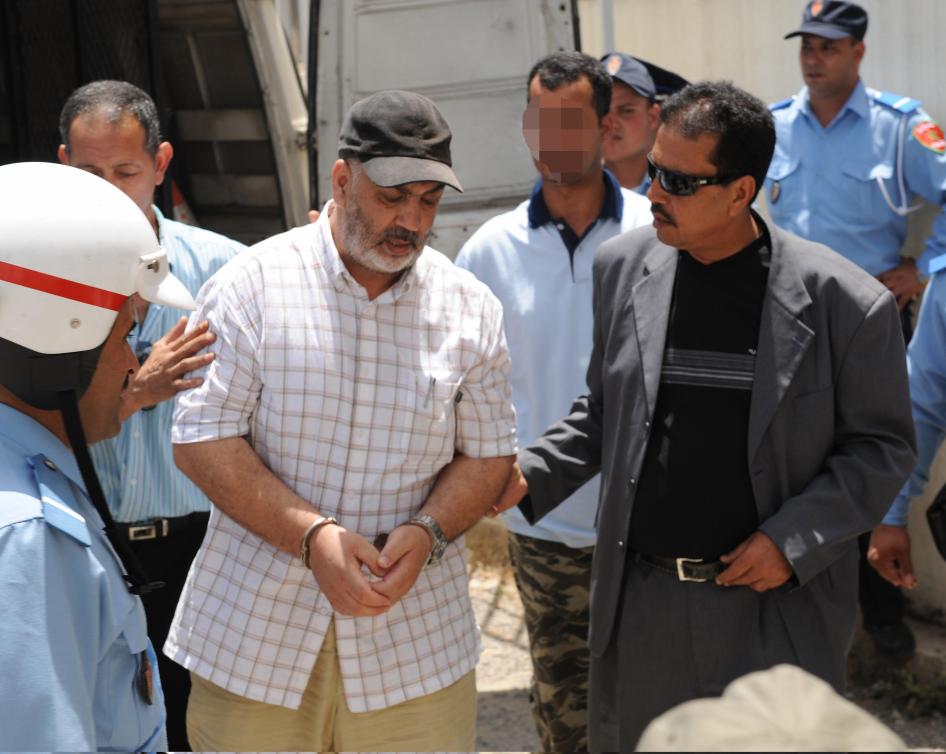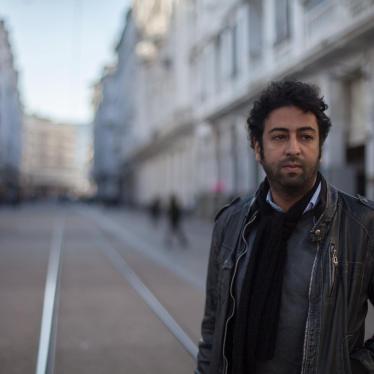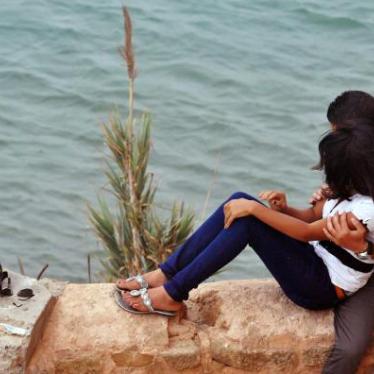(Tunis) – A man sentenced to life in prison in one of Morocco’s best-known trials for supposedly plotting terrorism, has apparently been held in abusive solitary detention for more than three years, Human Rights Watch said today. The mass trial in which he was convicted was marred by serious rights violations.
Abdelqader Belliraj, a dual Moroccan and Belgian citizen, is serving a life sentence largely based on his and co-defendants’ “confessions,” which they said were obtained under police torture. His wife told Human Rights Watch that Belliraj has been deprived of contact with inmates and confined to his cell 23 hours a day since 2016, which would contravene United Nations standards on the treatment of prisoners.
“It is bad enough when a man gets a life sentence as the result of a miscarriage of justice, but keeping him in inhuman prison conditions for years is like twisting the knife,” said Eric Goldstein, acting director for the Middle East and North Africa at Human Rights Watch. “Abdelqader Belliraj and all prisoners in Morocco should be treated humanely, and that includes having daily contact with other human beings.”
Rachida Hatti, Belliraj’s wife, who lives in Belgium, is allowed to speak with him by phone. She said that her husband, who is in Toulal 2 prison in Meknes, has been allowed to leave his cell only one hour a day since May 2016, and that the authorities deprive him of contact with fellow inmates. “He told me that he often rejects that one hour out, because what’s the point of walking alone in a courtyard like a madman?” she asked.
On November 12, 2019, Human Rights Watch sent a letter to the Inter-Ministerial Delegation for Human Rights, an official body, inquiring about Belliraj’s isolation. The delegation said they had forwarded the letter to the prison administration, but Human Rights Watch has received no other response.
The “Belliraj affair” made front-page news in Morocco in 2008, when the then-interior minister announced with much fanfare the arrests of 35 men alleged to form “one of the most dangerous terrorist organizations to be dismantled recently.” However, the charges against Belliraj and his 34 co-defendants, including 5 political figures and a TV journalist, included no concrete acts since at least 2001. Moreover, the acts attributed to Belliraj, the alleged ringleader, included murders in Belgium that Belgian authorities had declined to prosecute and a robbery in Casablanca for which others had already been tried and convicted.
Several defendants, including Belliraj, said they were abducted and spent weeks being held incommunicado, while they were interrogated and tortured in police stations. All the defendants said they were either physically coerced or tricked into signing false confessions, which were used later as the principal evidence against them. Neither the first instance court, which convicted all of them in 2009, nor the appeals court, which upheld the convictions in 2010, investigated their torture claims. Their sentences ranged from suspended prison sentences to life in prison.
In June 2011, the Court of Cassation confirmed most of the verdicts but sent six defendants for new trials. Five were convicted and one acquitted.
In 2012, King Mohammed VI granted his pardon to the journalist, four of the five political figures in the case, and one prisoner with serious health issues. Two others were pardoned in 2017, and 17 have left prison after serving their sentences. Eight men, with sentences ranging from 15 years to life in prison, remain behind bars, as far as Human Rights Watch has been able to determine: Belliraj, Mokhtar Lokman, Abdessamed Bennouh, Mohamed Yousfi, Abdellatif Bekhti, Abdellah Rammache, Jamal el-Bey, and Redouane el-Khalidi.
The UN Standard Minimum Rules on the Treatment of Prisoners, also known as the “Mandela rules,” define solitary confinement as spending 22 hours or more a day without meaningful human contact, and say that prolonged solitary confinement – over 15 consecutive days – is considered cruel, inhuman, or degrading treatment. Such treatment of prisoners is strictly prohibited under international law.
The Essex paper, a guidance document to those rules drawn up by experts, defines “meaningful contact” as “the amount and quality of social interaction and psychological stimulation which human beings require for their mental health.” The European Committee for the Prevention of Torture and Inhuman or Degrading Treatment or Punishment has noted that, “It is generally acknowledged that all forms of solitary confinement without appropriate mental stimulation are likely, in the long term, to have damaging effects resulting in deterioration of mental faculties and social abilities.”
Morocco’s prison administration has a history of keeping prisoners in harsh isolation conditions. Family members of Nasser Zefzafi, a leader of largely peaceful protests in the restive Rif region, told Human Rights Watch that Zefzafi had been prevented from leaving his cell for 23 hours a day during at least a year after his transfer to Casablanca’s Oukacha prison in 2017. Toufik Bouachrine, a critical journalist convicted for sexual assault in a trial that a UN working group said was tainted by due process violations, was prevented from meeting other inmates and speaking with guards for more than a year after he was placed in Casablanca’s Ain El Borja prison in 2018.
“Even though marred by due process violations, cases like Belliraj’s fade from view,” Goldstein said. “Ten years after their unfair trial, eight men remain in jail today, including at least one in apparently inhuman conditions. Let’s not forget their plight.”








